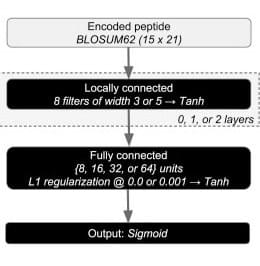

OpenVax
OpenVax
Research group at the Icahn School of Medicine at Mount Sinai
Research group at the Icahn School of Medicine at Mount Sinai
Research
Neoantigens
A neoantigen is a determinant of immune-mediated killing which has not been previously encountered by the adaptive immune system. We are particularly interested in neoantigens arising from somatic mutations in tumor cells, since these provide an attractive target for cancer immunotherapies. You can learn more from Schumacher & Schreiber's review paper Neoantigens in cancer immunotherapy.
The OpenVax group develops open source software and machine learning models for predicting different steps of the adaptive immune response to mutated tumor antigens.
Personalized cancer vaccines
Personalized therapeutic cancer vaccines are a form of cancer immunotherapy which instruct a patient’s immune system to target his or her particular tumor. Early phase I trials have shown some success (Sahin et al. 2017, Ott et al. 2017) and many new pharmaceutical companies are forming around these vaccines.
The OpenVax group is helping initiate and run several clinical trials of personalized cancer vaccines at the Mount Sinai Hospital, in collaboration with Dr. Nina Bhardwaj, Dr. Adilia Hormigo, Dr. Matthew Galsky, and Mount Sinai's Vaccine and Cell Therapy Lab.
Clinical Trials
Personalized cancer vaccine trials at Mount Sinai using our software
Principal Investigator: Nina Bhardwaj
Safety & immunogenicity trial for the PGV-001 vaccine, which consists of 10 neoantigenic peptides injected with an adjuvant (poly-ICLC). Broad set of malignancies: H&N, NSCLC, breast, ovarian, bladder, SCC, multiple myeloma. Patients must be disease-free when beginning treatment with PGV-001, so this trial is most applicable following a complete resection.
Principal Investigator: Adilia Hormigo
The PGV-001 neoantigen peptide vaccine in combination with standard-of-care temozolomide and Novocure's "tumor treating fields" for glioblastoma.
Principal Investigator: Matt Galsky
The PGV-001 neoantigen peptide vaccine in combination with an anti-PD-L1 checkpoint agent (atezolizumab) for bladder cancer.
Publications

This paper describes the sequencing protocol and computational pipeline for the PGV-001 personalized vaccine trial. PGV-001 is a therapeutic peptide vaccine targeting neoantigens identified from patient tumor samples. Peptides are selected by a computational pipeline which identifies mutations from tumor/normal exome sequencing and ranks mutant sequences by a combination of predicted Class I MHC affinity and abundance estimated from tumor RNA. The PGV pipeline is modular and consists of independently usable tools and software libraries. We hope that the functionality of these tools may extend beyond the specifics of the PGV-001 trial and enable other research groups in their own neoantigen investigations.

Predicting the binding affinity of major histocompatibility complex I (MHC I) proteins and their peptide ligands is important for vaccine design. We introduce an open-source package for MHC I binding prediction, MHCflurry. The software implements allele-specific neural networks that use a novel architecture and peptide encoding scheme. When trained on affinity measurements, MHCflurry outperformed the standard predictors NetMHC 4.0 and NetMHCpan 3.0 overall and particularly on non-9-mer peptides in a benchmark of ligands identified by mass spectrometry. The released predictor, MHCflurry 1.2.0, uses mass spectrometry datasets for model selection and showed competitive accuracy with standard tools, including the recently released NetMHCpan 4.0, on a small benchmark of affinity measurements. MHCflurry's prediction speed exceeded 7,000 predictions per second, 396 times faster than NetMHCpan 4.0. MHCflurry is freely available to use, retrain, or extend, includes Python library and command line interfaces, may be installed using package managers, and applies software development best practices.
Open Source Software
Generates a ranked list of personalized cancer vaccine peptides from somatic mutations and tumor RNA sequencing data. The most distinctive feature relative to other similar tools (MuPeXi, pVacSeq) is phasing of adjacent somatic/germline variants using a mutant coding sequence assembled from RNA reads.
Predict mutated peptide MHC ligands from somatic variants. Strictly a subset of the functionality of Vaxrank.
Determine mutant protein sequence by assembling RNA reads which overlap and support somatic variants. Useful for correctly incorporating other adjacent variants (phasing) as well as mutation associated splicing differences (intron retention).
Members



B.Sc. in Neuroscience from UIUC
M.Sc. in Computer Science from NYUPh.D. in Computer Science from NYU
Blog
Thoughts and research snippets
Cancer immunotherapy aims to recruit the body's own immune system to attack a tumor, which...June 27, 2018 · immunologyUri Laserson organized a delightful class at Mount Sinai called Applications of DNA Sequencing...




